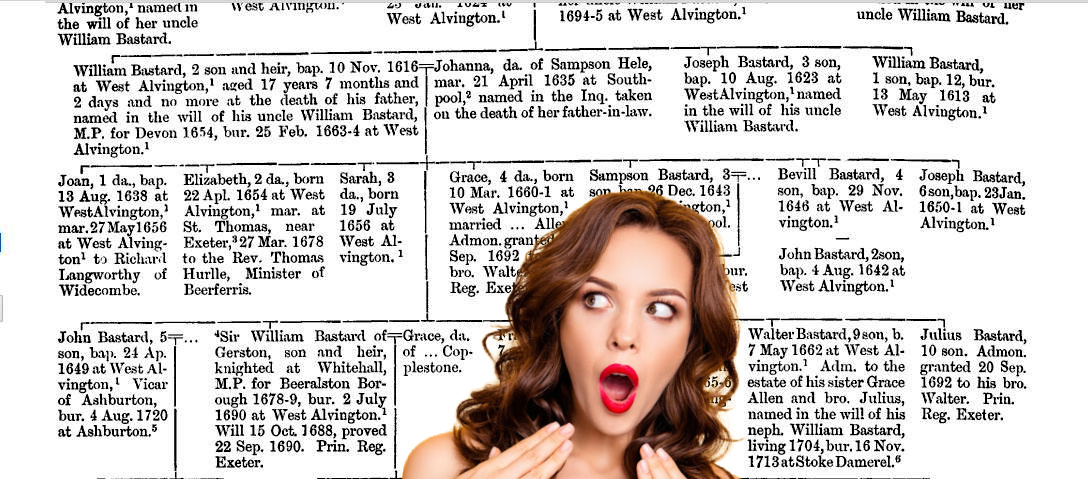
By James Pylant
Copyright © 2020 | Posted 13 November 2020
All Rights Reserved. Do not post or published without written permission.
Return to Features
In West Alvington, Devon, England, an infant with the unfortunate name of Admonition Bastard was christened in 1701. However, her surname had nothing to do with the circumstance of her birth but that of a long-ago ancestor.1 The Bastards of Devon had lived in the shire since the Norman Conquest when Robert le Bastard, as noted in the Domesday Book, held eight estates there.2
But how did the family come by that name? As I wrote in the article, “Weaselhead, Devil and Drunkard: Surnames Originating as Insults,” when last names were gradually and casually developed—as an effort to distinguish people on the all-important tax list—many people were saddled with silly or unflattering last names. Surname expert Charles W. E. Bardsley blamed the Normans (from whom the Bastards descended) and their bawdy sense of humor. “Broad comedy was a part of their nature, and a “vein for the ludicrous was speedily acquired. It spread in every rank and grade of society,” said Bardsley. “As time wore on, and the nation became more refined, there was an attempt made, successful in many instances, to throw off the more objectionable of these names.”3
Still, the Bastard name prevailed as the family gained prominence, influence, and wealth. William Bastard received a knighthood in the 1670s. Another William Bastard, his great-grandson,4 brought honor to the family name for his spirited quick-thinking in 1779. Sensing a potential French invasion off the Plymouth coast, William raised and led a corps of volunteers to transport prisoners of war from the port to Exeter. The king rewarded Bastard by making him a baronet;5 yet, for some reason, no steps were taken toward passing the patent, meaning his descendants did not inherit the title. The Baronet’s aunt, Admonition Bastard, shed her misbegotten moniker by marrying Walter Radcliffe.6 Several Bastards attended Oxford, including Baldwin Bastard who enrolled in 1847. He later returned to Devon and became High Sheriff.7
The revered Bastard name was blemished with scandal in generations to come. Admonition’s great-great-grandnephew, John Algernon Bastard, married Olivia Gertrude Louisa Stopford Claremont, the daughter of General E. S. Claremont, C.B., in 1879. The couple had two children, a son and a daughter, but in 1894 the couple separated. That was the year London newspapers published stories of the scandalous Bastard vs. Bastard, a divorce suit filed by Bastard against his wife. The petition revealed that the wife of Spencer Brunton had filed for divorce three years earlier, claiming that her husband had been carrying on with Mrs. Bastard since 1888, and that news appeared in The Times (London) in April of 1894.8
The family recovered from the scandal and honor was restored when the divorced couple’s son, Lieutenant Colonel Reginald Bastard, D.S.O. of the Lincoln Regiment,9 was wounded in the Battle of Messines in 1917.10 Still, Bastard—as a family name—no longer flourishes. The Dictionary of English Surnames notes the “sharp decline in numbers of bearers of this surname since the 19th century,” due, of course, to the negative connotation of the surname.11
NOTES AND REFERENCES
- Lieutenant-Colonel J. L. Vivian, The Visitations of the County of Devon, Comprising the Heralds’ Visitations of 1531, 1564, & 1620 (Exeter: Henry S. Eland, 1895), pp. 49-50.
- John Burke, Esq., A Genealogical and Heraldic History of the Commoners of Great Britain and Ireland, Vol. I (London: R. Bentley: MDCCCXXXIII), p. 17.
- Charles Wareing Endell Bardsley, English Surnames: Their Sources and Significations (London: Chatto and Windus, 1875), pp. 424-425
- Vivian, The Visitations of the County of Devon, Comprising the Heralds’ Visitations of 1531, 1564, & 1620, p. 50.
- Rev. Daniel Lysons and Samuel Lysons, Magna Britain; Being a Concise Topographical Account of the Several Counties of Great Britain, Vol. VI (London: Thomas Cadell, 1822), pp. xix-xx.
- Vivian, The Visitations of the County of Devon, Comprising the Heralds’ Visitations of 1531, 1564, & 1620, p. 50.
- Alumni Oxanienses: The Members of the University of Oxford, 1715—1888 (London: Parker & Co., 1888), p. 72.
- “Probate, Divorce, and Admiralty,” The Times (London), 16 April 1894, p. 3.
- “Forthcoming Marriages,” The Times, 29 January 1919, p. 11.
- Martin Middlebrook, The First Day of the Somme (Barnsley, South Yorkshire: Pen & Sword Military, 2006), p. 298.
- Patrick Hanks, Richard Coates, and Peter McClure, The Oxford Dictionary of Family Names in Britain and Ireland, Volume 1 (Aaron-Cushing) (Oxford, England: Oxford University Press, 2016), p. 161.
